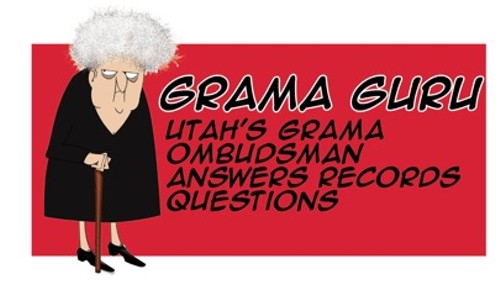Protect Yourself With GRAMA
Let public records come to your rescue
By Eric S. Peterson @ericspeterson
In 2011, the Utah Legislature tried to smother Utah’s GRAMA—the Government Records & Access Management Act—with a big fat pillow called House Bill 477. The bill would have rewritten GRAMA regulations to offer government more secrecy and put more of the costs for records requests on the public.
But Utahns weren’t ready to see GRAMA go, and after much public outrage, a special session was called and GRAMA was saved. Now, not only has Utah’s aging GRAMA been revived, but the Legislature has gone further and added a new GRAMA ombudsman to help the public and media navigate tricky records requests. State and local governments are even embracing the e-government model, working to put more records online, accessible at the click of a button.
GRAMA might have a reputation as being something that only hardbitten journalists use in the interest of muckraking. But this feature is dedicated to the average citizen, providing them with the practical advantages of using government records and other resources to gain the upper hand in everyday life.
For example, who is that mulleted guy your daughter brought home for dinner who says he’s a self-employed writer? Is that fixer-upper home you’re looking at a screaming deal because of increasing values, or because the crimes on your street had former residents running and screaming from the block? How is the contractor remodeling your kitchen spending your money? Has your doctor been sanctioned by the state because of a different understanding of “bedside” manners? You don’t need to hire a private eye or computer hacker to find out—public documents can answer these questions and more.
BEFORE YOUR DAUGHTER'S BOYFRIEND COMES TO DINNER
Let’s face it: There are lot of weirdos out there, and the guy dating your daughter could be one of them. Maybe he’s even planning an escape—with your daughter—to a desert compound where life is simpler, everyone is named Peter and Mary and the Kool-Aid is heady and delicious, with a killer aftertaste.
Before we get there, let’s talk better paranoid parenting through public records. This strategy can also be applied to any strangers entering your circle of trust who may need vetting, including potential family members, business partners, nannies or dog and/or plant sitters.
Take That Name to Court
Depending on your budget/level of paranoia, utilizing the records of the Utah Court System can be a cost-efficient way to get a quick fix on somebody’s criminal history. The Court Xchange program at UTCourts.gov/Xchange is a fee-based service that will allow you to run checks on a person’s criminal record, from justice-court charges to district court.
If you’ve Googled “free background check” websites, you’ve likely been redirected to a company that will charge you $20 to $50 for each criminal-history report. Each of those searches will add up to a pretty penny. A Utah court Xchange membership costs $25 to set up and $30 a month, but you’ll get 200 searches a month. Or you can go to your local district courthouse (find yours at UTCourts.gov/directory) and run a search and access these records for free.
Don’t forget to look up divorce files, which can be a treasure trove of information of not only someone’s past relationships but also his or her financial responsibility. In the Xchange system, there are codes for each type of case file available—look for DA, which stands for Divorce Agreement. You’ll also want to scope out bankruptcy files. Search the federal courts for these at Pacer.gov.
Pacer is also a good place to search court files that may affect a person’s business in other states or to see if they have any federal charges. But it will be most handy for bankruptcy documents, which reveal a lot about a person’s personal or business dealings. After you’re signed up, Pacer charges 10 cents per search and page accessed, with the cost of any single document capped at $3.
Social Media
But you thought of this already, didn’t you? Creeping someone on Facebook is a good way to see whom they cavort with and what kind of cavorting they do with their “friends.” Don’t forget snooping someone’s Twitter feed, seeing who they do business with by signing up on LinkedIn, and seeing whether they’ve got any interesting/incriminating photos on Flickr.
Get GRAMA!
You can also make requests directly with local police departments if you’ve got concerns about someone’s possible criminal history. Call the local police department and ask to search for arrest records for the individual. The trick here is knowing which police department to request records from, which requires some other public-record snoopery skills.
First, you can search a person’s name, phone number and address through a couple of reliable sources, like ZabaSearch.com or Switchboard.com. The subject in question may also have lived in different locales across the country, whether while traveling for jobs, education or being on the lam. You can get a good feel for the towns someone has called home by searching their name through PrivateEye.com. This site charges for background searches, but you can run a name for free. If you know one city the person has lived in, you can get an idea of other towns they may have lived in previously and check him out with those towns’ police departments.
BEFORE YOU BUY A HOME
When it comes to homebuying, your Realtor can be your best friend, or he or she could just be the person who’s trying to unload a listing on you. Whether you’re buying a home or a condo or you’re just renting, it pays to know all you can about your neighbors and your neighborhood before you move in the TV.
Get GRAMA!
It’s time again to flex your GRAMA skill. This time, think of requesting police-incident reports for the address of your prospective home as a kind of background check on your domicile. Call your local police station and ask if they have a special GRAMA form that can be downloaded from their website. Then request all incident reports for that address for a specific time period. The cost of a request may vary, depending on how far back you want to see reports. (For GRAMA tips and etiquette, see “GRAMA Knows Best”)
If there are few or no reports, then this service may cost little to nothing. You could also ask nicely of the police department’s records guru about searching nearby addresses or, to be more meticulous, you could submit the addresses of all the buildings on your street. This could give you a feel for whether the area is prone to burglaries, or if your neighbor’s band is prone to rocking out into the wee hours of the morning.
Mether Upper
You can also check with your local health department to see if that funny smell coming from the house is really because the previous owner had too many cats or if the previous owner’s cottage industry was cooking meth. Visit Health.Utah.gov/meth/html/decontamination/decondetails.html#list and check the bottom of the page for a list of links to local health departments where you can search for the list of contaminated meth properties.
Know Your Hoodrats
Public records and resources are good, but sometimes, nothing beats talking to the people who know a neighborhood best—local community councils. At the neighborhood level, homeowners often don’t know about community councils until it’s too late—that is, until a cell-phone tower, power box or halfway house is already being built next to someone’s home. The dedicated neighborhood watchers of your community council, however, will know all the details about your prospective neighborhood and will be glad to jaw with you about the pluses and minuses of the area. In Salt Lake City, find local community council information at SLCGov.com/CommCouncils.
Plan on Planning and Zoning and Everything Else
Another curveball to be on the watch for is how your neighborhood handles renovations and improvements (or, depending on how you look at it, demolitions and eyesores). By visiting the state’s public meeting notices website at Utah.gov/pmn/index.html, you can search for all public meetings in a neighborhood, including area city-council meetings, planning and zoning meetings and school-district meetings. Each listing includes a staff contact person whom you can call and ask about pressing issues on your street, find out if they’re raising property taxes for new parks or crosswalks or find out if the city is holding hearings on new developments in the area.
Howdy, Neighbor!
Everyone deserves a second chance, but there’s nothing wrong with knowing which of your neighbors are already on theirs. Visit the Utah Department of Corrections at Corrections.Utah.gov/services/sonar.html to see if any registered sex offenders live in your neighborhood.
MediaOne’s public-records supersite, UtahsRight.com, is a nifty place for all sorts of public-records gawking, but for the prospective home buyer/renter, the site has in recent years added a new function that allows you to search for parolees and offenders on probation by zip code: http://extras.sltrib.com/offenders/. This information is new as of January 2011, but you could go the extra mile and GRAMA the information yourself through Utah Corrections by contacting Utah’s Department of Corrections.
BEFORE YOU PUT THAT NEW KITCHEN IN
Now that you’ve GRAMA’d and researched your way into a home and have successfully avoided living on the corner of Meth Lane and Stab Street, you may come to realize your fixer-upper needs the expertise of a good contractor. After you Google some possible contractors, make sure they actually have a license, or you’ll risk getting duped like the folks who hired the Backwood Cabinetry con artist Steven Sizemore.
Sizemore was sentenced in July to up to 15 years in state prison for a three-year period during which he took customers’ money for cabinet-making jobs that he never delivered upon. Sizemore apparently was better at making empty promises than making cabinets and, according to the Utah Department of Commerce, swindled 21 victims out of $117,000. Those victims could have saved themselves a lot of trouble had they first checked Sizemore’s license status and seen that he was not licensed at all.
It’s an easy first step to go to the Utah Division of Occupational and Professional Licensing website at DOPL.Utah.gov and click on the “Verify License” link. There you can check to make sure your contractor is licensed and, under the “Agency & Disciplinary Actions Search,” you can also check to see if the state has taken any action against the contractor’s license for shoddy work or leaving folks high and dry with unfinished jobs.
Keep an Eye on Contractor Money
An underused but stellar tool for homeowners who want greater control over the work that goes into a renovation or construction project is the State Construction Registry. If a homeowner writes one big check to a contractor, that contractor can take that money and divvy it out to subcontractors and suppliers whom the homeowner may never meet or know anything about. If the project gets finished but somewhere down the supply line a subcontractor has shorted a supply company on lumber, tile or any other material, that supplier can smack a lien on the homeowner, who will be forced to pay double on supplies while the shady middleman is already onto the next job.
However, contractors are required by law to sign on to the State Construction Registry SCR.Utah.gov. This way, each person involved in building or renovating a home—from the contractor to the subs to the supplier—registers online along with how much money they are supposed to receive. This way, the homeowner can see how much each party needs and write a check to each one for exactly that amount. It also gives the homeowner the power to see who the subcontractor actually is so you can check them out with DOPL to see if he or she has a license or has gotten into trouble with the state before.
You can also see what projects contractors are currently working on at the State Construction Registry, which might give you an idea if the contractor is serious about finishing your job within the month or if he or she is trying to rush through half a dozen jobs at the same time.
BEFORE YOU GO TO THE DOCTOR
Since you’ve already checked out DOPL.Utah.gov, you might as well use the Agency & Disciplinary Actions search to check up on your doctor, dentist or any other number of licensed professionals to review any history of getting handsy with the patients or partying pre-surgery.
Through this search, you can check past actions the state has taken against the license of the individual. To check out all disciplined doctors in the state since 2000 and see their complete histories at a glance, visit City Weekly’s Doctor Discipline Database at CityWeekly.net/Doctors.
GRAMA GONE DIGITAL
Utah’s GRAMA law may be getting on in years, but new technological advancements continue to reinvigorate the law. Perhaps more importantly, government is learning that the solution to avoiding costly requests isn’t to try to discourage the public from accessing government records but to put more and more records online.
As the reader can tell from this guide, there are already warehouses worth of paper documents out in the e-world waiting to be accessed and downloaded. And as more average Utahns access those and use GRAMA for everything else, it will push the government to put more of its records—from the tedious to the titillating—online. Which means that requesting more openness, transparency, information and enlightenment from your government depends upon you, dear reader. Only you can prevent another HB477. So, go on, get those docs, and get GRAMA!
To access the GRAMA law in its entirety, go to http://citywk.ly/MJXtp7.
GRAMA Knows Best:
How to get public records to work for you
After the public organized against the Legislature’s attempt to stifle GRAMA in 2011, lawmakers saw the error of their ways and decided to repeal the bill. Since then, the Legislature has studied and passed in 2012 Senate Bill 177, a law modification that is a far cry from 2011’s House Bill 477. The bill made minor fixes, found funding for records officers in local government to receive extra training on GRAMA, and created a GRAMA ombudsman to help field calls from average citizens about navigating GRAMA.
For those stumped and in need of a guiding hand, ombudsman Rosemary Cundiff of the Utah State Archives can help (see "GRAMA Guru").
Before requesting records, it’s a good idea to ask an agency if there is a specific form individuals should use. Otherwise, you can get a good, all-purpose form from the Attorney General’s website AttorneyGeneral.Utah.gov/GRAMA.html
For GRAMA beginners, a taste of
public records worth requesting:
•Police Incident Reports: These are basic descriptions of incidents, arrests or simple calls for service.
E-mails:The communications of public officials are totally fair game for requesting. This doesn’t mean you’ll get them. Government officials have the right to withhold or redact records that contain private information or may pertain to an active investigation, among other restrictions.
Budgets, Salaries, Bonuses: If taxpayer money is involved, you should be able to GRAMA it. You may hit a roadblock trying to find out information before a particular budget is proposed, but otherwise, you paid for it, so you should get to see the receipt—be that the cost of a road, a city councilman’s salary or the contract for garbage pickup in your neighborhood.
GRAMA Tips and Etiquette:
With the power of being able to access public records comes responsibility. You should be careful to not make your GRAMA too burdensome for the government agency fulfilling the request. Also consider that being polite to a public-records officer is often the best way to get the information you’re after.
Prime the Pump: Despite how you may feel about guv’ment—whether a tax collector or a police department—remember that the records officer is a person, with feelings. Legally, you could just fax or e-mail a GRAMA request over, passively avoiding talking to the records person, but that would be a mistake. By talking to the right person, you might find that they can send you the records without a formal request, or they may tell you the best way to phrase the request so that you get what you’re looking for without paying big bucks for copies and research fees.
Don’t GRAMA Angry: Sometimes in matters of local government, a citizen can let anger get the better of them. In 2002, one citizen began a records battle with the town of Alta that resulted in seven years of fighting and the production of more than 250,000 documents. It was also the kind of “fishing expedition” that motivated legislators to try to rein in GRAMA. When you request records, be specific about what documents you want. Don’t request every e-mail or document from every person at an agency ever since it was formed and expect the person processing your request to do it happily. You should expect, however, that if the request is too large, you’ll be expected to pay research costs that could hit your wallet pretty hard.
Keep Costs Down: Speaking of GRAMA costs, you should also remember that on a GRAMA request, you can request that an agency notify you when a request exceeds a certain amount. If you really want to save money on copying costs, the law also says that all records should be available for inspection for free. That way you might be able to inspect boxes of records and then get a 25 cent copy of just the two pages you want, instead of the thousands they’re hidden among. But you will still pay for research costs if records have to be compiled and sorted into one spot.
Fight the Denial: If you feel that an agency has denied records that should rightfully be yours, you can fight the power. The process varies depending on the agency, but for the majority of decisions, you will appeal first to the head of the agency that first denied your request. Then, if necessary, you can appeal it again to the State Records Committee. Here, you are encouraged to plead your case in simple terms before a citizen-staffed board. The board will then recommend whether the agency should disclose the records to you.
Keep in mind the SRC is made up of easy-going folks who wish to accommodate average citizens—but their decision isn’t binding. If they recommend an agency turn over the goods, it’s just that—a recommendation. The record-holders can still fight that decision—meaning that the battle then goes to court.
More by Eric S. Peterson
-
The Secret Sauce
How Utah lawmakers disclose—or don't disclose—conflicts of interest.
- Feb 14, 2024
-
Police departments in Salt Lake County spent almost $20 million on civil rights complaints in the past decade
The Co$t of Mi$conduct
- Oct 18, 2023
-
Women decry harassment and toxic culture at St. George auto dealership
Men at Work
- Oct 11, 2023
- More »
Latest in Cover Story
Readers also liked…
-
Forget the family pedigree—Robert F. Kennedy Jr should not be the next president of the United States
Trojan Horse
- Jun 21, 2023
-
Women decry harassment and toxic culture at St. George auto dealership
Men at Work
- Oct 11, 2023













